Covid rips through Hong Kong aged care as China locks down
Hong Kong aged care facilities record tragic death rate as less than half of 70-year-olds, and only one-third of 80-year-olds, are fully vaccinated.
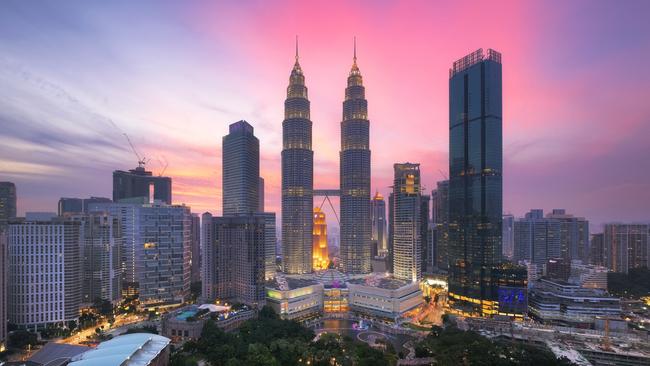
World
Don't miss out on the headlines from World. Followed categories will be added to My News.
As much of the world emerges from Covid restrictions, China and Hong Kong have spiralled into increasingly extreme lockdowns and breakouts as the virus continues to spread through major population centres.
The virus is tearing through Hong Kong’s care homes, with some 60 per cent of the nearly 3,000 virus deaths there in the last two months occurring in the facilities.
Hong Kong’s strict zero-Covid policy kept the coronavirus at bay for two years, but the city’s barriers fell to the highly transmissible Omicron variant at the start of 2022.
In less than three months, the fifth wave’s 600,000 confirmed infections have thoroughly eclipsed the 12,000 recorded in the pandemic’s first two years.
Nearly 60,000 residents live in Hong Kong’s elderly care homes, with more than 1,700 deaths among 22,070 infected tenants at a fatality rate nearing eight per cent.
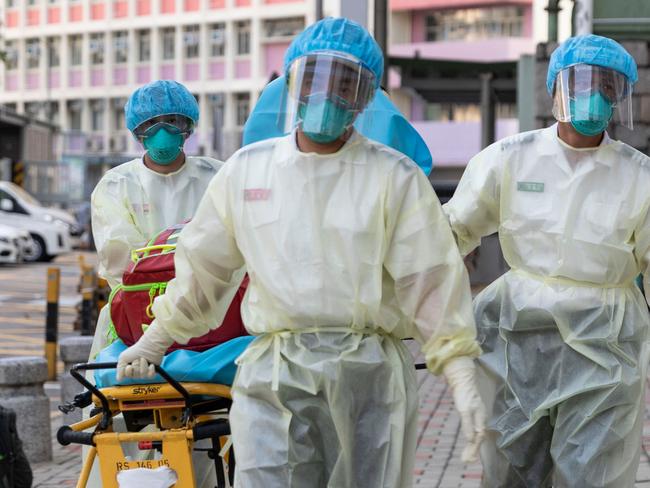
So far, less than 50 per cent of residents in their 70s have received two vaccine jabs, while only 32 per cent of over-80s have two vaccine shots.
As more than 700 facilities recorded infections, Hong Kong’s leader Carrie Lam said all care home residents would receive at least one vaccine dose within two weeks.
Tenants in the homes are often bedridden, living in spaces measuring as little as 70 square feet (6.5 square metres) and separated by crude partitions. At Gracious Alliance, a facility in Hong Kong island’s Aberdeen district, half the 32 tenants and all staff members were infected within a fortnight.
CHINA LOCKS DOWN CITY OF NINE MILLION
On the mainland, China locked down nine million people in the northeastern city of Changchun and Shanghai shut its schools as the country records the worst spike in new cases in two years.
Only one person from every household will be allowed out every two days to buy “daily necessities”, officials in Changchun said.
The city also halted all public transport, ordered schools and businesses shut and said it would institute mass testing.
China’s daily coronavirus case count soared past the 1,000 mark this week for the first time since the pandemic’s early days in 2020. That is up from fewer than 100 cases just three weeks ago as the highly transmissible Omicron variant challenges China’s zero-Covid approach to tackling the pandemic.
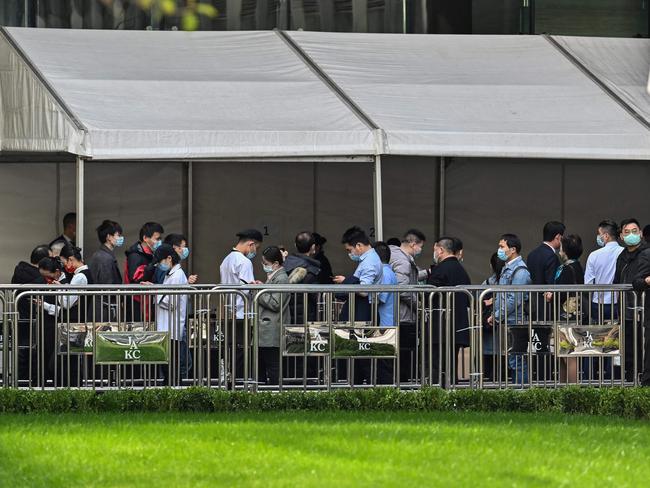
Economic hub Shanghai shut its schools, with other cities using targeted lockdowns and mass testing to contain the outbreak driven by the highly-contagious Omicron variant.
As cases increased, the country’s National Health Commission announced that they would introduce the use of rapid antigen tests for the first time.
The kits will now be available online or at pharmacies for clinics and ordinary citizens to buy for “self-test”, the health commission said, although nucleic acid tests will continue to be the main method of testing.
AUSTRIA’S SUPRISE COVID VACCINE BACKFLIP
Austria, meanwhile, has announced it will suspend its mandatory Covid-19 vaccinations for all adults saying the pandemic no longer poses the same danger, just weeks after the law took effect in an EU first.
The Alpine nation of nine million people was among few countries in the world to make jabs against the coronavirus compulsory for all adults.
The law took effect in February and called for fines up to 3,600 euros ($3,940) from mid-March for those who do not comply.
But minister Karoline Edtstadler said the law’s “encroachment of fundamental rights” could no longer be justified by the danger posed by the pandemic.
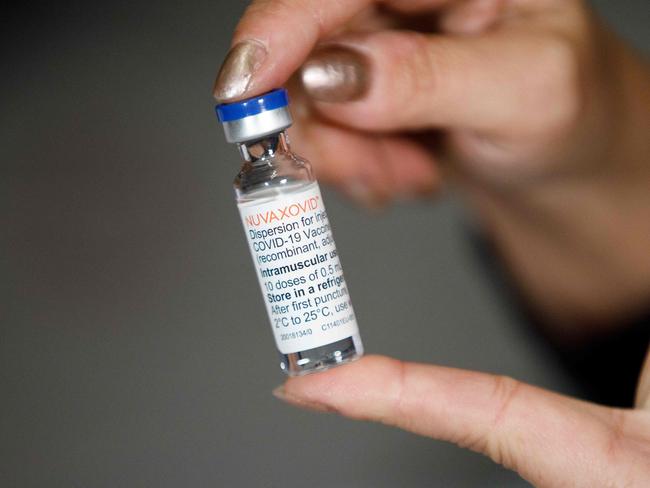
“After consultations with the health minister, we have decided that we will of course follow what the (expert) commission has said,” Edtstadler told reporters after a Cabinet meeting.
“We see no need to actually implement this compulsory vaccination due to the (Omicron) variant that we are predominantly experiencing here.” The highly-contagious variant is widely believed to be less severe than previous strains of the virus, and so far Austrian hospitals have been able to cope with a surge in cases.
This has led to the government to drop most coronavirus restrictions in recent weeks.
The government has stressed it needs to act flexibly in line with the epidemiological situation.
“Just like the virus keeps on changing, we need to be flexible and adaptable,” Edtstadler said.
The decision to suspend the law will be reviewed in three months, said Johannes Rauch, who took over as health minister this week as the third since the start of the pandemic.
WHO’S GRIM NEW COVID WARNING
The pandemic is far from over, the WHO’s leader has insisted, two years after he first used the term to wake the world up to the emerging threat of Covid-19.
The World Health Organisation’s director-general Tedros Adhanom Ghebreyesus first described Covid-19 as a pandemic on March 11, 2020.
Two years on, he lamented how the virus was still evolving and surging in some parts of the world.

The WHO declared a public health emergency of international concern – the highest level of alarm in the UN health agency’s regulations – on January 30, 2020, when, outside of China, fewer than 100 cases and no deaths had been reported.
But it was only the use of the word pandemic six weeks on that seemed to shake many countries into action.
“Two years later, more than six million people have died,” Tedros told a press conference, while nearly 444 million cases have been registered.
“Although reported cases and deaths are declining globally, and several countries have lifted restrictions, the pandemic is far from over – and it will not be over anywhere until it’s over everywhere.”
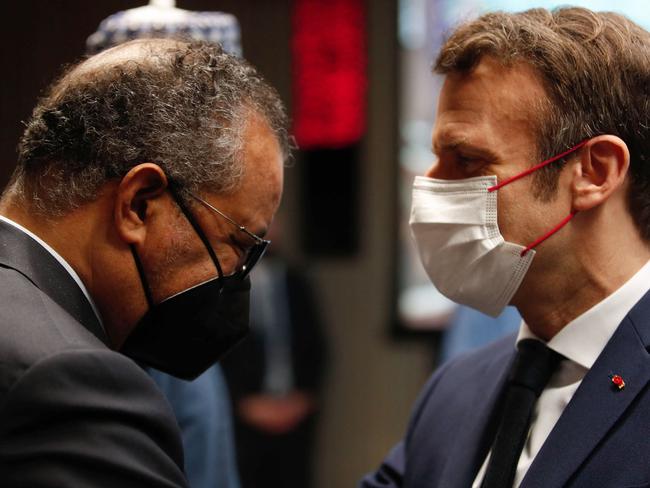
He noted the 46 per cent rise in new cases last week in the WHO’s Western Pacific region, where 3.9 million infections were recorded.
“The virus continues to evolve, and we continue to face major obstacles in distributing vaccines, tests and treatments everywhere they are needed,” Tedros said.
He also sounded a warning on the recent plunge in testing rates, saying it left the planet blind to what Covid-19 was up to.
“WHO is concerned that several countries are drastically reducing testing,” Tedros said.
“This inhibits our ability to see where the virus is, how it’s spreading and how it’s evolving.”
CALL FOR VIGILANCE
The number of fresh cases fell five per cent worldwide last week compared to the week before, while the number of deaths dropped eight per cent.
However, Maria Van Kerkhove, the WHO’s Covid-19 technical lead, warned that the case rate was certainly an underestimate due the dramatic drop-off in testing.
“The virus is still spreading at far too intensive a level, three years into this pandemic,” she said.
“Even though we are seeing declining trends … there were still more than 10 million reported cases reported at a global level last week.
“We have to remain vigilant.”
In its weekly update on the spread of the virus, the WHO said earlier that the Omicron variant had “global dominance” over other mutations of the virus.
The WHO said Omicron accounted for 99.7 per cent of samples collected in the last 30 days that have been sequenced and uploaded to the GISAID global science initiative.
The WHO says unequal access to Covid-19 vaccines, tests and treatments remains rampant and is prolonging the pandemic.
On jabs, the WHO’s latest figures show 23 countries are yet to fully immunise 10 per cent of their populations, while 73 countries are yet to achieve the 40 per cent coverage target set for the start of 2022.
BRITAIN’S QUEST FOR SUPER VACCINE
Britain has committed more than 30 million pound in its quest to develop a “variant-proof” vaccine that can offer more durable protection against Sars-Cov2, and guard against coronaviruses that don’t yet exist. Prime Minister Boris Johnson hailed the technology as part of the “next generation of vaccines” as he opened a conference in London held by the Coalition for Epidemic Preparedness Innovations, The Times has reported. CEPI will provide up to 32 million for the vaccine, made by the Cambridge University spin-out Diosynvax – one of several seeking to target parts of the virus less likely to mutate.
“We are looking at the broad family of coronaviruses to find out what it is the virus can’t change,” Professor Jonathan Heeney, from the university, said.
Researchers have identified bits of the virus that stay constant – which means the vaccine could protect against variants, as well as coronaviruses that emerge in the future.
“These are invariable parts of the virus that it can’t alter without killing itself – or at least impairing its ability to replicate,” Prof Heeney said.
The technology is different from other Covid vaccines.
Most leading products try to achieve the same goal – to introduce the coronavirus spike protein into our bodies.
Then the hope is that our bodies learn to recognise the spike, which is the part of the virus that unlocks cells, and fight it off.
The problem is that this “incentivises” the virus to evolve to evade protection, by changing its spike.
The scientists looked through the genomes of Covid-19 and related coronaviruses to find the parts that cannot change.
Then, instead of simply copying the spike protein, they designed what they hope are better targets for the immune system.
MALAYSIA TO RE-OPEN FOR TOURISM
Malaysia will re-open to all vaccinated tourists next month and join a growing number of countries removing restrictions in an attempt to live with Covid.
The tourism-reliant Southeast Asian country, known for its white-sand beaches and lush rainforests, shut its borders in March 2020 but will now require only a negative Covid test to enter, authorities said on Tuesday.
“The government has decided to open its borders on April 1, 2022,” Prime Minister Ismail Sabri told reporters.
“We believe this decision will boost our economy and help revive our ailing tourism sector.” The reopening comes despite Malaysia reporting more than 25,000 infections a day in recent weeks, though most cases have been mild.
Its decision mirrors those of neighbouring nations including Singapore, Thailand and the Philippines that are progressively easing entry rules to lure back tourists.
Malaysia’s economy contracted 5.6 per cent in 2020 as Covid hit but rebounded slightly to grow 3.1 per cent last year.
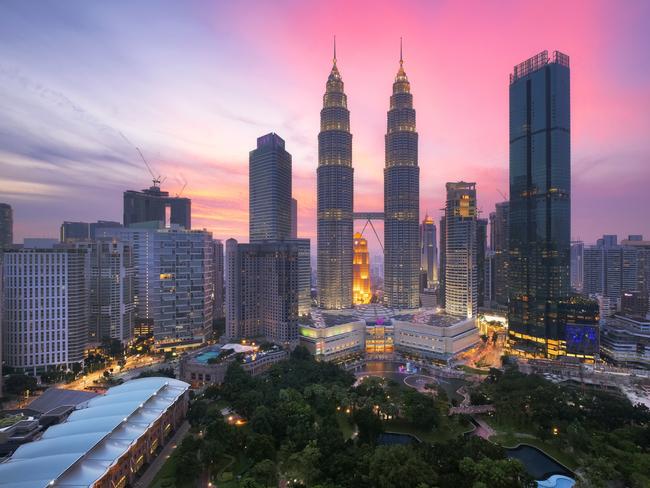
Malaysia-based AirAsia, one of Southeast Asia’s top budget airlines, called the move “timely” and said it “will provide a strong impetus” for recovery in tourism and aviation.
Group chief executive Bo Lingam told AFP the carrier hoped to move around a million passengers in the first week.
Vaccinated travellers will not be subject to quarantine but will need to produce a negative PCR test two days before arrival and take an antigen test in the 24 hours after entry.
Previously only travellers from Singapore were allowed quarantine-free entry. Malaysia has recorded more than 3.6 million Covid cases to date with more than 33,000 deaths.
About 80 per cent of the country’s 32 million population have been fully vaccinated.
Originally published as Covid rips through Hong Kong aged care as China locks down


